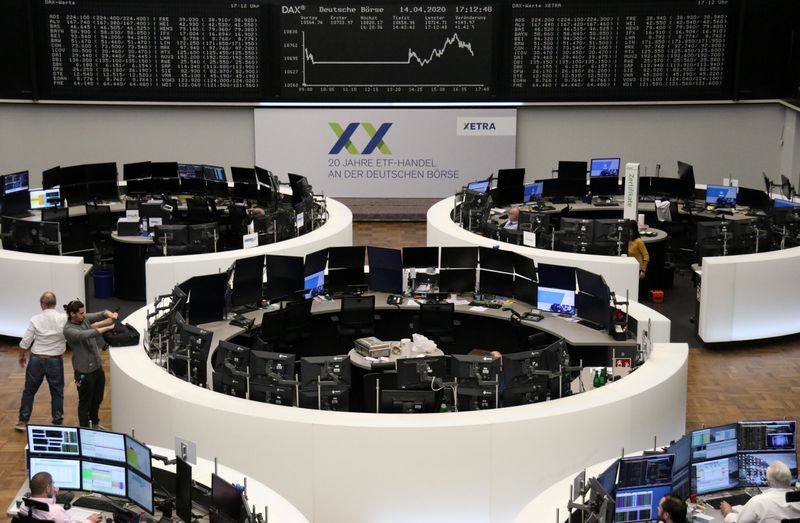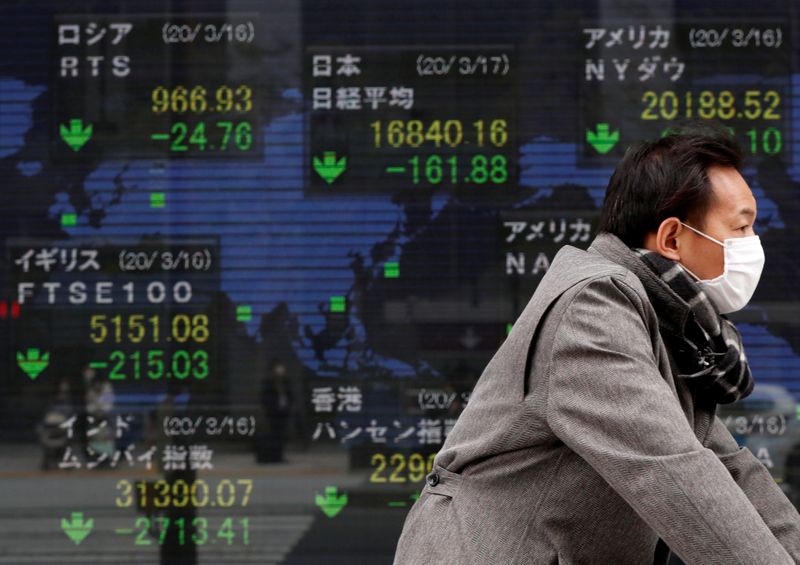By Tom Arnold
LONDON (Reuters) - Global stocks fell on Wednesday as oil prices dropped and warnings of the worst global recession since the 1930s underscored the economic damage done by the coronavirus pandemic.
European stock markets faltered, with the pan-European STOXX 600 index down 1.9% after five days of gains fuelled by suggestions the health crisis was ebbing and lockdown measures may soon start to ease.
Much of the damage was felt by oil companies. Total SA (PA:TOTF), Royal Dutch Shell (LON:RDSa) Plc and BP (LON:BP) Plc all sank, pushing the European energy index to its lowest this month as oil prices fell.
Benchmark Brent crude futures traded down 4% to $28.46 after the International Energy Agency on Wednesday forecast a drop in oil demand of 29 million barrels per day in April, to levels not seen in 25 years. It warned no output cut by producers could offset the decline.
Much economic damage has also already been done, with the International Monetary Fund predicting the world this year would suffer its steepest downturn since the Great Depression of the 1930s.
China earlier moved again to cushion its economy, cutting a key medium-term interest rate to record lows, paving the way for a similar reduction in benchmark loan rates, while reducing the amount banks must hold as reserves.
Those moves are injecting a combined $43 billion into world's second largest economy, but they failed to boost for world shares. MSCI's All-Country World Index, which tracks shares across 49 countries, was down 0.6%.
Graphic - World stocks. vs. COVID-19 confirmed cases: https://fingfx.thomsonreuters.com/gfx/mkt/nmovaoayvab/Pasted%20image%201586938359448.png
Focus is now starting to shift to the corporate results due in the coming weeks. Signs of stress caused by the pandemic are already widespread.
"A lot of good news has been priced in and we're due for some consolidation, particularly as we head into earnings season, as we all know the numbers will not be good," said Francois Savary, chief investment officer at Swiss wealth manager Prime Partners.
PERSISTENT WORRIES
Dutch navigation and digital mapping company TomTom shed 2.7% after saying it expected negative free cash flow this year and lower revenue from its automotive and consumer businesses due to the pandemic.
London-based asset manager Jupiter Fund Management dropped 5.6% after reporting an 18.3% drop in assets under management in the first quarter as fears over the pandemic rattled financial markets.
In the United States, E-Mini futures for the S&P 500 fell 1.8%, following a 3% rise in New York.
Bank of America Corp (NYSE:BAC) recorded a 48.5% fall in quarterly profit as the bank set aside $3.6 billion for potential loan losses tied to the coronavirus pandemic.
Even as some U.S. states considered relaxing restrictions, the country's death toll rose by at least 2,228, a single-day record, according to a Reuters tally.
President Donald Trump responded by saying some states could still open shortly or even immediately. He also temporarily halted funding to the World Health Organization, saying it should have done more to head off the pandemic.
Italian bonds remained under pressure amid disappointment over the half-a-trillion-euro plan to support coronavirus-hit economies agreed by euro zone finance ministers last week.
Italy's two-year bond yield was last up 11 basis points at 0.95% after rising nearly 20 bps on Tuesday. Ten-year yields were up 4 basis points at 1.83%.
The gap with Germany's 10-year bond yield, effectively the risk premium Italy pays investors, continued to rise, to 225 bps, retracing much of the tightening since the European Central Bank announced emergency bond purchases in mid-March.
In currencies, the dollar rebounded as concern persisted that the damage to the global economy. The U.S. currency gained across the board, particularly against currencies considered riskier bets, such as sterling, where it was around 1% higher.

Gold prices fell as investors locked in profits after recent gains. It was last at $1,721 an ounce.
